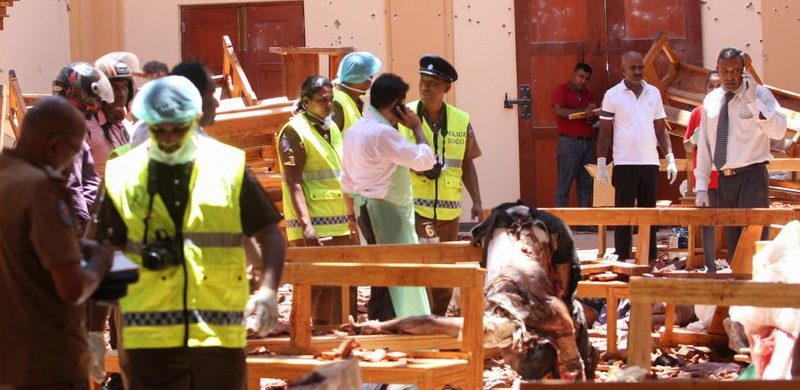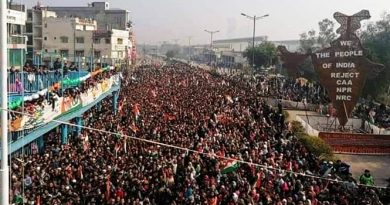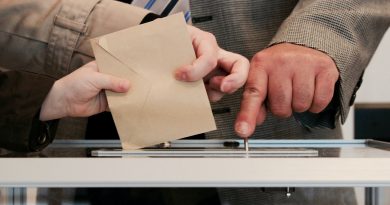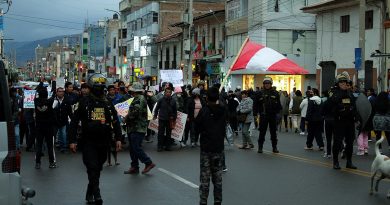Sri Lankan Easter Day Bombings Devastate Country
Sam Adams
Staff Writer
Attacks took place early Easter morning while church services were underway in Catholic churches and hotels across Sri Lanka, according to the Associated Press. The day quickly took on an atmosphere of horror as nine explosions rocked the capital city, Colombo, leaving broken glass in the streets and smoke billowing into the sky.
Four other targets were struck, including two churches, a guesthouse, and a road overpass, resulting in a death toll of 253. The death toll initially stood at 359 but was recently revised down due to difficulty identifying victims, reports Al Jazeera. Most of those who perished were of Sri Lankan descent; a smaller number of victims were from neighboring India and nearby China, as well as Western nations like the United States, UK, and Portugal, according to CNN.
In the Negombo region, the site of Saint Anthony’s Shrine attack appeared to be the deadliest. The region is also home to a number of Muslim refugees fleeing persecution in Pakistan. Amid fears of communal violence and retaliation for the bombings, hundreds of Muslims have fled the region.
Easter Sunday in Sri Lanka draws out most of the nation’s million and a half Christians. Christians are the smallest religious minority in the nation, making up just over seven percent of the Sri Lankan population. They follow closely behind Muslims, who number just below 10 percent of the population.
Sri Lanka’s government says the attack was carried out by nine suicide bombers including one woman, says Al Jazeera. Although initially no credit was taken for the attack, the Islamic State (IS) recently claimed responsibility. The government also suspects that local radical groups were involved in the attacks.
Confusion and anger were only worsened when news broke that the government might have had prior knowledge of a threat and failed to act. According to the New York Times, a top Sri Lankan police official had warned security services of a threat to churches by a local radical Islamist group called National Thowheeth Jama’ath. It is unclear what, if any, actions were taken by the government to prevent the attacks or if the group was involved at all.
Prime Minister Ranil Wickremesinghe in the days following the attack denied receiving any prior knowledge of the attacks and argues for that reason he does not need to step down from his position. While the PM may be staying put, the country’s defense minister and police chief have since resigned, according to BBC News. The scandal deepened when Sri Lanka’s health minister told the press that authorities were alerted at least two weeks prior to the attacks taking place, although this information was not shared with the Prime Minister, reports the Guardian.
Health Minister Senaratne is quoted by the Guardian as saying “This is the only country where when the prime minister summons the security council they don’t assemble…We are not trying to evade responsibility but these are the facts. We were surprised to see these reports.” In Sri Lanka, the President is charged with the defense of the nation, not the Prime Minister.
Further reports from the BBC claim that Sri Lankan intelligence services believe 130 Islamic State militants were in the country, with 70 at large being hunted by police. Police forces later raided a supposed safe house where they found an IS flag as well as what seemed to be uniforms used by the group. Three police officials and several other people were killed in the operation, according to the Associated Press. At a separate location, police engaged in a shootout with alleged suspects of the bombings.
The alleged ringleader of the attacks, Zahran Hashim, died in the attacks at the Shangri-La hotel in Colombo. Hashim was thought to be accompanied by his son while carrying out the bombing. He, as well as seven other men thought to be attackers, appeared in a video released by the Islamic State in which the men pledged allegiance to the group.
The complexity and planning of the attacks point to the involvement of an international terror group, but it is unclear if the men were in contact with IS or if the merely pledged allegiance to it. This information was released by the President, highlighting a fractious government amidst nation-wide curfews from 6pm-6am. The Catholic Church in Sri Lanka has also suspended all activities until further notice.




